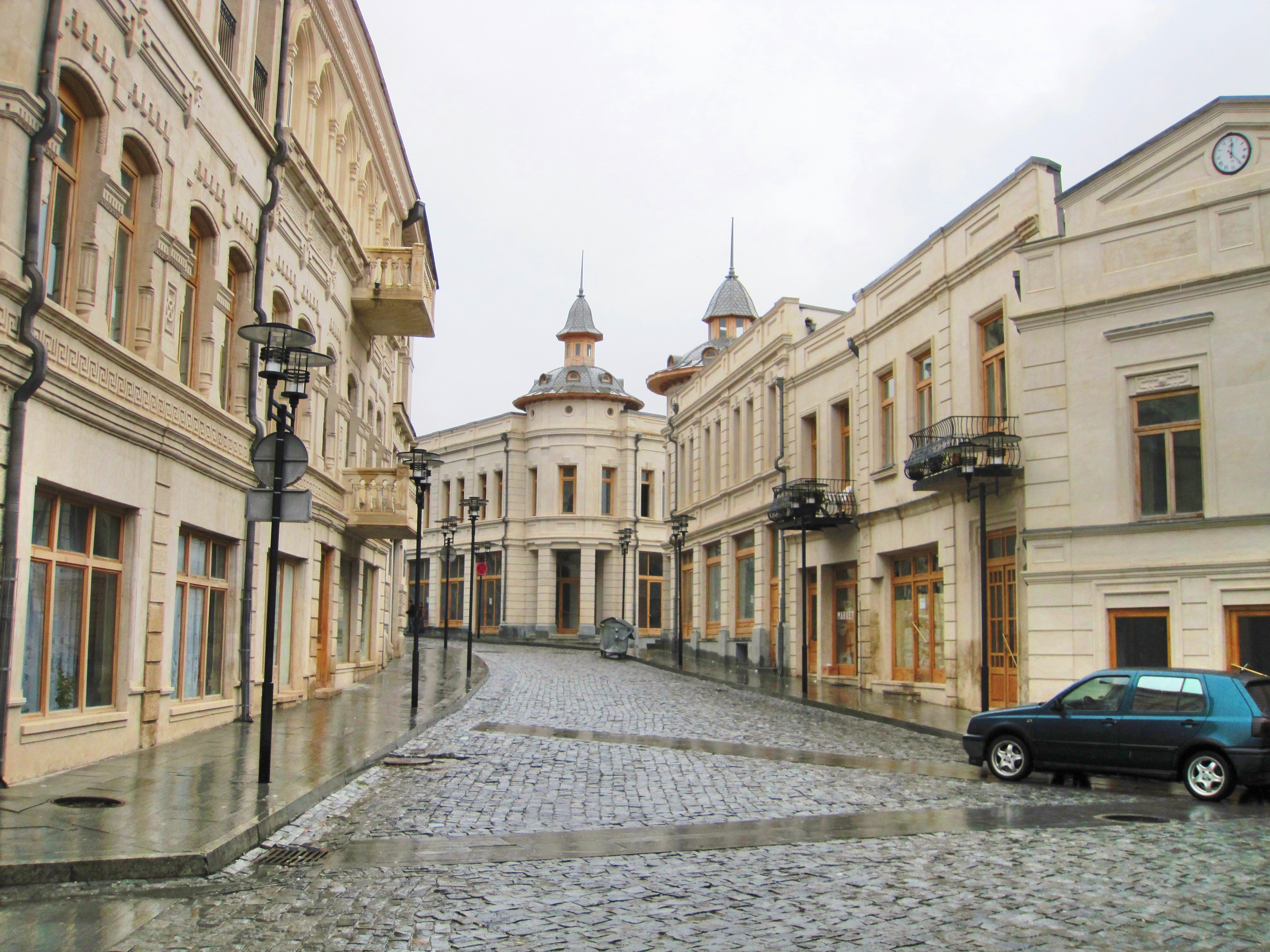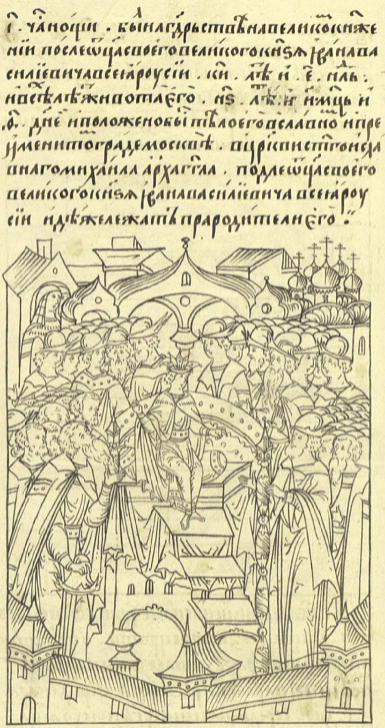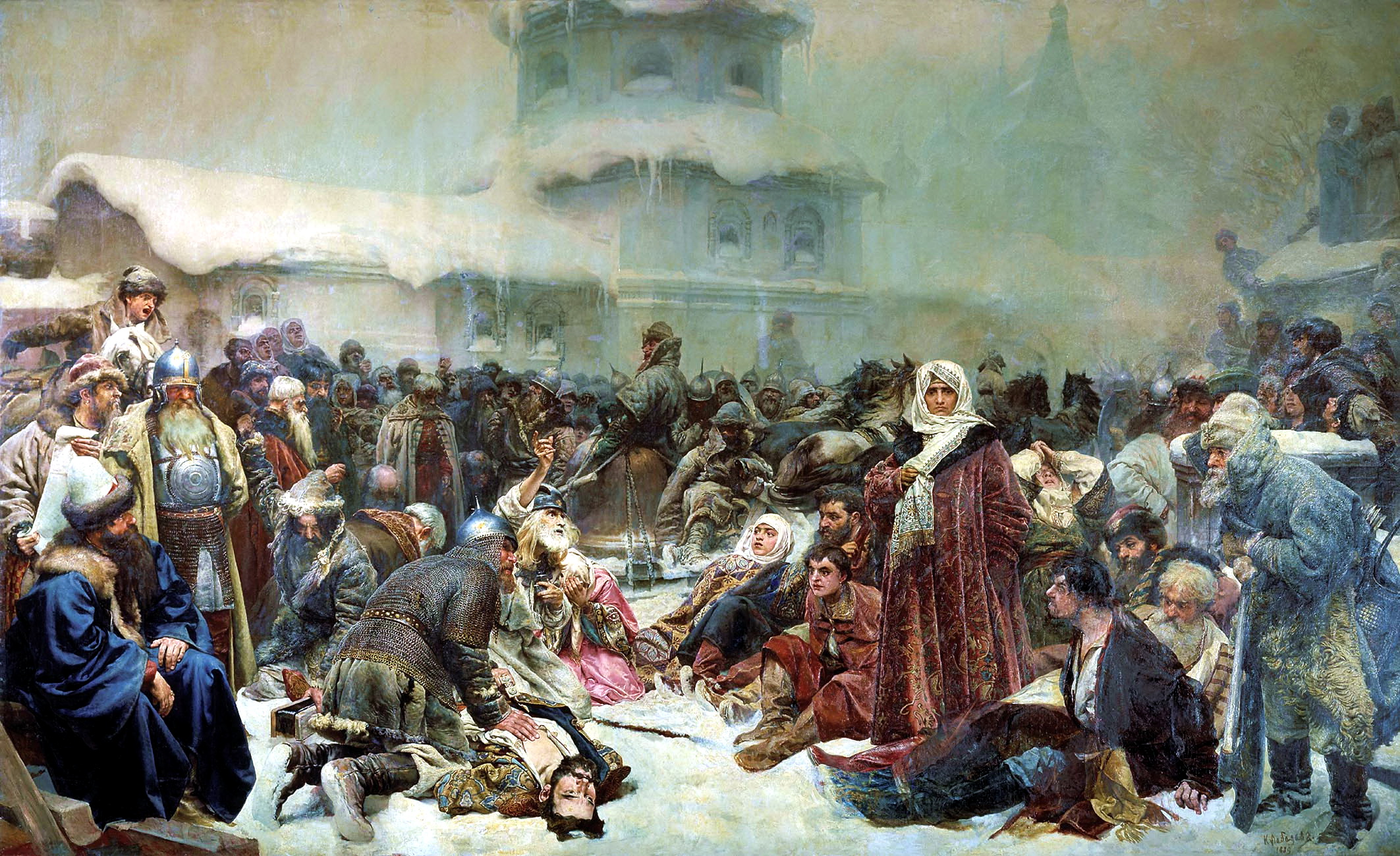|
Ruslan Skrynnikov
Ruslan Grigorievich Skrynnikov (Руслан Григорьевич Скрынников; 8 January 1931, Kutaisi, Georgian SSR – 16 June 2009, St. Petersburg, Russia) was a Russian historian who studied the reign of Ivan the Terrible. He later moved on to study the Time of Troubles. For Skrynnikov, control over the bureaucratic apparatus (rather than the issue of centralization) was the primary point of contention explaining Muscovite political struggles of the 15th and 16th centuries. Nancy Shields Kollmann. ''Kinship and Politics: The Making of the Muscovite Political System, 1345–1547''. Stanford University Press, 1987. Page 15. In the late 1960s he described Ivan's Oprichnina as the reign of terror designed to root out every possible challenge to the autocracy: Skrynnikov' monographs about the Oprichinina and the Russian conquest of Siberia have been reprinted many times and translated into other major languages. He also authored the biographies of Ivan III, Ivan IV ... [...More Info...] [...Related Items...] OR: [Wikipedia] [Google] [Baidu] |
Kutaisi
Kutaisi ( ; ka, ქუთაისი ) is a city in the Imereti region of the Georgia (country), Republic of Georgia. One of the List of oldest continuously inhabited cities, oldest continuously inhabited cities in the world, it is the List of cities and towns in Georgia (country), fourth-most populous city in Georgia after Tbilisi, Batumi and Rustavi. It lies west of Tbilisi, on the Rioni River, and is the capital of Imereti. Historically one of the major cities of Georgia, it served as the political center of Colchis in the Middle Ages as the capital of the Kingdom of Abkhazia and Kingdom of Georgia and later as the capital of the Kingdom of Imereti. From October 2012 to December 2018, Kutaisi was the seat of the Parliament of Georgia as an effort to decentralize the Georgian government. History Archaeological evidence indicates that the city functioned as the capital of the Colchis in the sixth to fifth centuries BC. It is believed that, in ''Argonautica'', a Greek litera ... [...More Info...] [...Related Items...] OR: [Wikipedia] [Google] [Baidu] |
Ivan IV
Ivan IV Vasilyevich (; – ), commonly known as Ivan the Terrible,; ; monastic name: Jonah. was Grand Prince of Moscow and all Russia from 1533 to 1547, and the first Tsar and Grand Prince of all Russia from 1547 until his death in 1584. Ivan's reign was characterised by Russia's transformation from a medieval state to a fledgling empire, but at an immense cost to its people and long-term economy. Ivan IV was the eldest son of Vasili III by his second wife Elena Glinskaya, and a grandson of Ivan III. He succeeded his father after his death, when he was three years old. A group of reformers united around the young Ivan, crowning him as tsar in 1547 at the age of 16. In the early years of his reign, Ivan ruled with the group of reformers known as the Chosen Council and established the ''Zemsky Sobor'', a new assembly convened by the tsar. He also revised the legal code and introduced reforms, including elements of local self-government, as well as establishing the first ... [...More Info...] [...Related Items...] OR: [Wikipedia] [Google] [Baidu] |
People From Kutaisi
The term "the people" refers to the public or Common people, common mass of people of a polity. As such it is a concept of human rights law, international law as well as constitutional law, particularly used for claims of popular sovereignty. In contrast, a people is any plurality of Person, persons considered as a whole. Used in politics and law, the term "a people" refers to the collective or community of an ethnic group or nation. Concepts Legal Chapter One, Article One of the Charter of the United Nations states that "peoples" have the right to self-determination. Though the mere status as peoples and the right to self-determination, as for example in the case of Declaration on the Rights of Indigenous Peoples, Indigenous peoples (''peoples'', as in all groups of indigenous people, not merely all indigenous persons as in ''indigenous people''), does not automatically provide for independence, independent sovereignty and therefore secession. Indeed, judge Ivor Jennings i ... [...More Info...] [...Related Items...] OR: [Wikipedia] [Google] [Baidu] |
2009 Deaths
This is a list of lists of deaths of notable people, organized by year. New deaths articles are added to their respective month (e.g., Deaths in ) and then linked below. 2025 2024 2023 2022 2021 2020 2019 2018 2017 2016 2015 2014 2013 2012 2011 2010 2009 2008 2007 2006 2005 2004 2003 2002 2001 2000 1999 1998 1997 1996 1995 1994 1993 1992 1991 1990 1989 1988 1987 1986 Earlier years ''Deaths in years earlier than this can usually be found in the main articles of the years.'' See also * Lists of deaths by day * Deaths by year (category) {{DEFAULTSORT:deaths by year ... [...More Info...] [...Related Items...] OR: [Wikipedia] [Google] [Baidu] |
1931 Births
Events January * January 2 – South Dakota native Ernest Lawrence invents the cyclotron, used to accelerate particles to study nuclear physics. * January 4 – German pilot Elly Beinhorn begins her flight to Africa. * January 22 – Sir Isaac Isaacs is sworn in as the first Australian-born Governor-General of Australia. * January 25 – Mohandas Gandhi is again released from imprisonment in India. * January 27 – Pierre Laval forms a government in France. * January 30 – Charlie Chaplin comedy drama film ''City Lights'' receives its public premiere at the Los Angeles Theater with Albert Einstein as guest of honor. Contrary to the current trend in cinema, it is a silent film, but with a score by Chaplin. Critically and commercially successful from the start, it will place consistently in lists of films considered the best of all time. February * February 4 – Soviet leader Joseph Stalin gives a speech calling for rapid industrialization, arguing that only strong indus ... [...More Info...] [...Related Items...] OR: [Wikipedia] [Google] [Baidu] |
Academic Staff Of Saint Petersburg State University
An academy (Attic Greek: Ἀκαδήμεια; Koine Greek Ἀκαδημία) is an institution of tertiary education. The name traces back to Plato's school of philosophy, founded approximately 386 BC at Akademia, a sanctuary of Athena, the goddess of wisdom and Skills, skill, north of Ancient Athens, Athens, Greece. The Royal Spanish Academy defines academy as scientific, literary or artistic society established with public authority and as a teaching establishment, public or private, of a professional, artistic, technical or simply practical nature. Etymology The word comes from the ''Academy'' in ancient Greece, which derives from the Athenian hero, ''Akademos''. Outside the city walls of Athens, the Gymnasium (ancient Greece), gymnasium was made famous by Plato as a center of learning. The sacred space, dedicated to the goddess of wisdom, Athena, had formerly been an olive Grove (nature), grove, hence the expression "the groves of Academe". In these gardens, the philos ... [...More Info...] [...Related Items...] OR: [Wikipedia] [Google] [Baidu] |
Russian Medievalists
Russian(s) may refer to: *Russians (), an ethnic group of the East Slavic peoples, primarily living in Russia and neighboring countries *A citizen of Russia *Russian language, the most widely spoken of the Slavic languages *''The Russians'', a book by Hedrick Smith *Russian (comics), fictional Marvel Comics supervillain from ''The Punisher'' series *Russian (solitaire), a card game * "Russians" (song), from the album ''The Dream of the Blue Turtles'' by Sting *"Russian", from the album ''Tubular Bells 2003'' by Mike Oldfield *"Russian", from the album '' '' by Caravan Palace *Nik Russian, the perpetrator of a con committed in 2002 See also * *Russia (other) *Rus (other) Rus or RUS may refer to: People * East Slavic historical peoples (). See Names of Rus', Russia and Ruthenia ** Rus' people, the people of Rus' ** Rus, a legendary eponymous ancestor, see Lech, Czech and Rus * Rus (surname), a surname found in ... * Rossiysky (other) * Russian Rive ... [...More Info...] [...Related Items...] OR: [Wikipedia] [Google] [Baidu] |
Soviet Historians
This list of Russian historians includes historians, as well as archaeologists, paleographers, genealogists and other representatives of auxiliary historical disciplines from the Russian Federation, the Soviet Union, the Russian Empire and other predecessor states of Russia. Alphabetical list __NOTOC__ A * Valery Alekseyev (1929–1991), anthropologist, proposed ''Homo rudolfensis'' * Mikhail Artamonov (1898–1972), historian and archaeologist, founder of modern Khazar studies, excavated a great number of Scythian and Khazar kurgans and settlements, including the fortress of Sarkel * Artemiy Artsikhovsky (1902–1978), archaeologist, discoverer of birch bark documents in Novgorod B * Vasily Bartold (1869–1930), turkologist, the "Gibbon of Turkestan", an archaeologist of Samarcand * Konstantin Bestuzhev-Ryumin (1829–1897), 19th-century historian and paleographer, founder of the Bestuzhev Courses for women * Nikita Bichurin (1777–1853), a founder of Sinology, ... [...More Info...] [...Related Items...] OR: [Wikipedia] [Google] [Baidu] |
Ivan III
Ivan III Vasilyevich (; 22 January 1440 – 27 October 1505), also known as Ivan the Great, was Grand Prince of Moscow and all Russia from 1462 until his death in 1505. Ivan served as the co-ruler and regent for his blind father Vasily II before he officially ascended the throne. He multiplied the territory of his state through conquest, purchase, inheritance and the seizure of lands from his dynastic relatives, and laid the foundations of the centralized Russian state. He also renovated the Moscow Kremlin and introduced a new legal code. Ivan is credited with ending the dominance of the Tatars over Russia; his victory over the Great Horde in 1480 formally restored its independence. Ivan began using the title tsar, and used the title tentatively until the Habsburgs recognized it. While officially using "tsar" in his correspondence with other monarchs, he was satisfied with the title of grand prince at home. Through marriage to Sophia Palaiologina, Ivan made the double-hea ... [...More Info...] [...Related Items...] OR: [Wikipedia] [Google] [Baidu] |
Georgian SSR
The Georgian Soviet Socialist Republic, also known as Soviet Georgia, the Georgian SSR, or simply Georgia, was one of the republics of the Soviet Union from its second occupation (by the Red Army) in 1921 to its independence in 1991. Coterminous with the present-day republic of Georgia, it was based on the traditional territory of Georgia, which had existed as a series of independent states in the Caucasus prior to the first occupation of annexation in the course of the 19th century. The Georgian SSR was formed in 1921 and subsequently incorporated in the Soviet Union in 1922. Until 1936 it was a part of the Transcaucasian Socialist Federative Soviet Republic, which existed as a union republic within the USSR. From November 18, 1989, the Georgian SSR declared its sovereignty over Soviet laws. The republic was renamed the Republic of Georgia on November 14, 1990, and subsequently became independent before the dissolution of the Soviet Union on April 9, 1991, whereupon each f ... [...More Info...] [...Related Items...] OR: [Wikipedia] [Google] [Baidu] |
Russian Conquest Of Siberia
The Russian conquest of Siberia took place during 1581–1778, when the Khanate of Sibir became a loose political structure of vassalages that were being undermined by the activities of Russian explorers. Although outnumbered, the Russians pressured the various family-based tribes into changing their loyalties and establishing distant forts from which they conducted raids. It is traditionally considered that Yermak Timofeyevich's campaign against the Siberian Khanate began in 1581. The annexation of Siberia and the Far East to Russia was resisted by local residents and took place against the backdrop of fierce battles between the indigenous peoples of Siberia and the Russian Cossacks, who often committed atrocities against indigenous Siberians. The conquest of the region was a spontaneous event organized by a group of adventurers; it is one of the early European colonial campaigns. Conquest of the Khanate of Sibir The Russian conquest of Siberia began in July 1581 when so ... [...More Info...] [...Related Items...] OR: [Wikipedia] [Google] [Baidu] |






